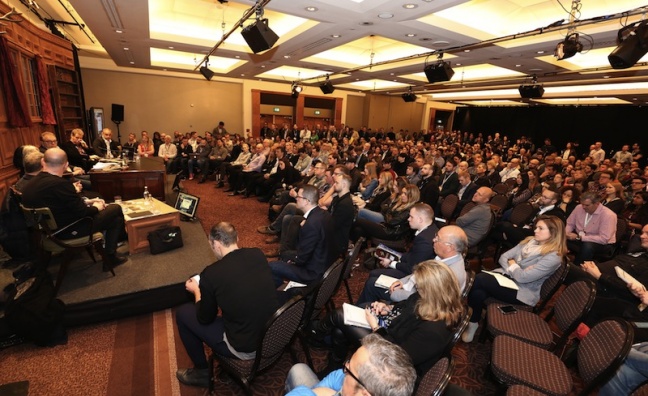The potential impact of Brexit on the live business and the struggles with breaking new talent were pored over at the International Live Music Conference (ILMC) in London.
Held at the Royal Garden Hotel in Kensington from March 5-8, the invitation-only event welcomes over 1,000 of the world’s leading live music professionals from more than 60 countries.
The Open Forum: With Or Without EU panel, chaired by Live Nation's Phil Bowdery, featured an all-star panel including Coda Agency's Alex Hardee, Tim Leiweke of Oak View Group, Marsha Vlasic of Artist Group International, Detlef Kornett of DEAG, Solo Agency's John Giddings and Bill Silva of Bill Silva Management.
Hardee bemoaned the recent shortage of breakthrough talent in the UK compared to the US.
"There's one or two acts that break from the UK, there's a lot of acts breaking from America very quickly," he said. "Who's going to break this year? Lewis Capaldi, Billie Eilish, who's American, I could name them on one hand.
"There's no smoke and mirrors, that's the problem. A record label could create talent even if it wasn't very good by putting money into marketing and getting it on Radio 1. Now there are three important stats: ticket sales, streaming numbers and social media/Instagram engagement.
"You can't fake it anymore, that's the problem. [Previously] if you put £5 million behind a project, you'd probably get a result unless it was particularly terrible. You don't have that guarantee now.
"The other thing is the more you put out, the more chance you have of success – that's why hip-hop's so successful. They don't go, 'I've got a 12-week cycle', they just go, 'Bang, here it is'. You've got an advantage if you can produce stuff quickly, keep on feeding that machine and a lot of the record labels haven't caught up with that yet."
"How are we going to sell tickets if the talent is not growing?" added Vlasic. "I think there should be some kind of emphasis on that problem right now."
Hardee also discussed the prospect of songs being written via biotechnology. "You've got biotech now that can measure all your emotions and then you've got a computer that can read what's happening to your body when certain sounds are made, so they they give it an algorithm to make it react," he said. "That's what they're doing now, they're starting to get algorithms to write songs that will work on the streaming services. AI, it's scary."
Previously if you put £5 million behind a project, you'd probably get a result unless it was particularly terrible. You don't have that guarantee now
Alex Hardee, Coda Agency
The session also heard from Dick Molenaar, partner with Rotterdam-based All Arts Tax Advisers, who advised on the current Brexit situation.
"There are two topics that are problematic and that is the movement of persons and the movement of goods," said Molenaar. "The movement of goods in a no deal situation is the real problem because the ATA Carnet [passport for goods] system has not been worked out at all. So in a no deal situation at March 29, how do you get your equipment abroad?"
Kornett said: "Almost 25% of the live music industry in Europe comes from the UK so if it gets harder to get from the UK to Europe, our live music landscape will suffer so I think there should be a vested interest to avoid that by any means."
Isle Of Wight Festival promoter Giddings quipped: "We're in a gambling business and it's just another gamble we're taking with Brexit. You just have to try and protect yourself against it as good as you can. All these morons running our country, what can you say about them? We elected them..."
However, Molenaar did offer some cause for optimism. "There is a positive side," he said. "VAT for services becomes easier so when UK artists are going to other EU countries after a no deal Brexit it becomes easier, also the other way around, because that is no Intra-EU service anymore. You don't need to have the VAT registration number of the foreign company anymore, it's just a service abroad and you just can use the zero rate, so that's the positive part. So to be honest I'm not so negative, only the movement of goods is still problematic."
On a separate note, Silva pointed to the success of online video game Fortnite and predicted the future of live entertainment would involve more interactive experiences.
"It's going to get more interactive, there's a lot of creative artists who are already working on these kind of things and obviously Tim [Leiweke] and MSG and the venues they're creating that's intended to make it a more interactive experience," he said.
"I keep thinking about how Fortnite is a $60 billion business and they don't charge for the game. It's bigger than the recorded music industry by a multiple.
"I think there's a lot to be learned from what's going on there. People are choosing to spend their time on that activity rather than music, rather than concerts, rather than whatever. That's a choice. There's a model around giving an engagement, an experience that encourages them to spend. It's the old drug dealer thing, first one's on me right? Not that I was a drug dealer..."
The 31st edition of ILMC continues on Thursday.











